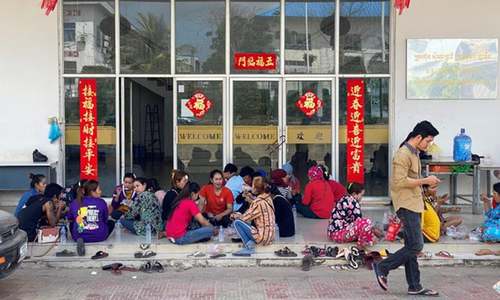Hundreds of people began disembarking a quarantined cruise ship off Japan on Wednesday as the death toll from the new coronavirus in mainland China passed 2,000 and the number of new cases in the country fell for a second straight day.
Around 500 passengers were due to disembark the virus-hit Diamond Princess docked at Yokohama near Tokyo, public broadcaster NHK said, ending an ordeal that began when the ship was quarantined on February 3 after a former passenger was diagnosed with the virus in Hong Kong.
There were also more promising signs out of China, where the National Health Commission reported the lowest daily rise in new infections since January 29, or 1,749 new confirmed cases. Hubei province —the epicentre of the outbreak — reported the lowest number of new infections since Feb 11.
The latest figures bring the total number of cases in China to over 74,000 and the total death toll to 2,004, three quarters of which have occurred in the Hubei provincial capital of Wuhan. Six people have died outside mainland China, including a new fatality announced on Wednesday in Hong Kong.
The biggest concentration of infections outside of China was aboard the Carnival Corp-owned Diamond Princess, with more than 540 people infected out of about 3,700 passengers and crew on board when the quarantine was imposed.
The United States has already flown back over 300 American evacuees from the ship and other countries are queuing up to collect their citizens, including an Australian flight due to arrive in Japan later on Wednesday.
"We were lucky. We booked a room with a balcony and a lounge area, but after being confined to this cabin I am very keen to get off this ship," Australian passenger Vicki Presland told Reuters.
Only passengers who had tested negative for the virus and did not show symptoms during quarantine period would be allowed to leave the ship. Those who tested negative but were in cabins with infected people would remain on board for additional quarantine, Japanese officials said.
Japanese officials defended the decision to quarantine the ship and test people on board.
"Unfortunately, cases of infection have emerged, but we have to the extent possible taken appropriate steps to prevent serious cases, including sending infected people to hospital," NHK quoted Health Minister Katsunobu Kato as saying.
Fever medication checks
On top of steps already taken to isolate Hubei, where the flu-like virus originated late last year in a market illegaly selling wildlife, state media reported the province was stepping up efforts to track down anyone with fever.
The province will check records of all fever patients who have visited doctors since Jan. 20, and people who have bought over-the-counter cough and fever medications at both brick-and-mortar and online drug stores, Xinhua reported.
Several Chinese cities have declared that a shortage in blood supply for clinical use was imminent, state media reported on Tuesday, as travel curbs keep potential donors at home.
Chinese officials have said the apparent slowdown in infection rates is evidence that strict measures are working to bring the virus under control, but global health officials say it is too early to predict how the epidemic will play out.
The number of new cases in mainland China excluding Hubei has now fallen for 15 straight days. The number of new infections ex-Hubei totalled 56 on Feb 18, down from a peak of 890 on Feb 3.
The head of a leading hospital in Wuhan, where the virus is believed to have originated, died of the disease on Tuesday, the seventh health worker to have succumbed to the disease, known as COVID-19.
The World Health Organisation's (WHO) emergencies programme chief, Mike Ryan, said China had success with "putting out the fire" first in Hubei and ensuring that people returning to Beijing from the Lunar New Year holiday were monitored.
Ryan also said there were no indications the new coronavirus was infecting people in North Korea. Some South Korean media outlets have reported multiple cases and possible deaths in the secretive North.
Global repercussions
China's ambassador to the European Union said on Tuesday the economic impact of the disease would be "limited, short-term and manageable".
Chinese state television quoted President Xi Jinping as saying China could still meet its economic growth target for 2020, despite some economic analysts downgrading their China forecasts.
Even so, China's economy was struggling, with many factories closed and others still not at full production after the extended New Year break, disrupting global supply chains and firms like US tech giant Apple and major automakers.
Britain's biggest carmaker, Jaguar Land Rover, has flown Chinese parts in suitcases to Britain to maintain production and could run out after two weeks because of the coronavirus.
Data this week from Japan and Singapore indicated those economies are on the brink of recession, while South Korean President Moon Jae-in said his country's economy is in an emergency situation.
Economists are warning of potential mass layoffs in China later this year if the virus is not contained soon.
Analysts at Nomura estimated 70 per cent of workers who went home for holidays have yet to return to cities to work and that the business resumption rate was less than 40pc.
Foreign pilots at some Chinese airlines have returned to their home countries and are considering other jobs after being placed on unpaid leave as demand falls, affected flight crew told Reuters.
Data firm OAG estimates about 80pc of scheduled airline capacity to, from and within China has been cut this week because of the epidemic.













































